HRC59: Commission Urges Action on Violations of Palestinians' Rights
The 59th Session of the Human Rights Council
16 June – 09 July 2025
Item 2: ID with the Commission of Inquiry on the Occupied Palestinian Territory, including East Jerusalem, and Israel
17 June 2025
By Elisa Goislard Nguyen / GICJ
Executive Summary
On 17 June 2025, during the 4th meeting of the 59th regular session, the Human Rights Council held an interactive dialogue (ID) with Navanethem Pillay, lead Commissioner of the Commission of Inquiry (COI) in the Occupied Palestinian Territories (OPT), including East Jerusalem, and Israel. During the ID, Mrs. Pillay presented the Commission’s latest report on violations of international humanitarian and human rights law (IHL/IHR) in the OPT, detailing deliberate instances of Israeli military attacks on educational, religious, and cultural sites, many of which serve as refuge sites for Palestinians in Gaza. Furthermore, the report lingered on the intensification of Israeli violence in the occupied West Bank, with increasing settler attacks on Palestinians and Palestinian worshipers at non-Jewish heritage sites, as well as illegal land annexations.
This report follows the Resolution S-30/1[1] adopted by the Human Rights Council on 27 May 2021, which established an ongoing independent COI to investigate all violations of IHL and IHR leading up to and since 13 April 2021, and “all underlying root causes of recurrent tensions, instability and protraction of conflict” in the OPT with the foundational objective of securing justice and respect for the rule of law and human rights—indispensable bases for peace and security in the region.
Geneva International Centre for Justice (GICJ) urges the international community to take tangible actions to end the ongoing genocide, protect the Palestinian people’s safety, dignity, and unalienable right to self-determination, and enable the immediate and unimpeded access of humanitarian aid and UN investigators to Gaza and the OPT in accordance with the ICJ order of 24 May 2024.
Background
This meeting took place against the backdrop of Israel’s genocidal war in Gaza. Rather than viewing violence in Israel-Palestine as an isolated conflict since Hamas’ attack on 7 October 2023, it is critical to historicise the genesis of the ‘Palestinian question,’ recognizing the longstanding policies of Israeli apartheid and colonial occupation since the Nakba of 1948. This meeting, set within the framework of IHL and IHR, addressed grave concerns of war crimes, crimes against humanity, including the crime of extermination, and called attention to the urgent need for accountability and concrete international action. The ID also addressed grave concerns over the killings at the Israeli and US-backed Gaza Humanitarian Foundation aid sites, which the head of UNRWA has labelled a “death trap.”
Summary of the Expert’s Report
Published on 6 May 2025, the Commission’s latest report focused on Israeli attacks on educational, religious, and cultural infrastructure, with a particular focus on how these acts relate to the denial of the Palestinian people’s right to self-determination. While it mainly highlighted attacks on and after 7 October 2023, attention is directed to prior incidents that evidence a pattern of continual violations.
Attack on Educational Facilities
Between 7 October 2023 and 25 February 2025, 403 out of a total of 564 school buildings have been destroyed in Gaza, disrupting the education of 435,290 students and impacting 16,275 teachers. While these military assaults have significantly obstructed the Palestinian population’s unalienable right to education, it is important to note that many of these facilities served as shelters for internally displaced refugees, resulting in mass civilian casualties. The United Nations Relief and Work Agency for Palestine Refugees in the Near East (UNRWA) educational facilities also suffered extensive damage. In one of the most devastating incidents, the Al-Falah/Zeitoun elementary school was attacked on 17 November 2023—while almost 4,000 people were sheltering—killing at least 20 Palestinians. From late October 2023 onwards, Israeli forces systematically demolished educational facilities to expand the buffer zone on the eastern, southern, and northern borders of the Gaza Strip.
While Israel justified its actions as necessary to “prevent future incursions of armed groups into Israel” via Gaza, the Commission “could not identify any military objective” for these actions. Moreover, through comparative geospatial analysis, the Commission refuted claims that the Israeli military had discovered a Hamas tunnel connecting the Turkish-Palestinian Friendship Hospital to the Isra University building in March 2024, revealing instead that the location in question was Al-Azhar University’s El-Muhraqa campus. Image and video analysis showcasing Israeli soldiers parking their cars and moving freely, at times even celebrating the demolitions and mocking Gazans, confirmed that there was no significant threat to the Israeli military. The Commission also found that Israeli forces intentionally burned down schools under the pretext that they were harboring militants, as in the case of Mahdia al-Shawa School in Beit Hanoun, which was set on fire by the Rotem Battalion of the Givati Brigade on 11 November, 2024, and where civilians had been receiving aid from the World Food Programme. The report details other instances in which Israeli forces seized and repurposed educational facilities for military uses, under the pretext that they served as Hamas command centers—claims that the Commission could not verify due to Israel’s refusal to grant access to these sites. Yet, the recurrence of such actions points to a deliberate pattern of targeting educational facilities.
Attacks and interference with education have also been reported in the West Bank, including East Jerusalem. Palestinian students have experienced significant reductions in school days due to recurring settler attacks, vandalism, military raids, and movement restrictions, causing some communities to lose up to half an academic year. Israel’s expansion of roadblocks in the West Bank has further hindered access to educational facilities, with the UN Office for the Coordination of Humanitarian Affairs reporting a 25% drop in attendance rates in January 2025. The report also noted that some students expressed fear about passing through checkpoints to reach school, citing incidents of harassment, including one case in which an Israeli soldier exposed his genitals to women and girls at the checkpoint in the H2 area of Hebron.
Attack on Religious and Cultural Sites
As of 29 November 2024, UNESCO had verified damage to 75 sites in Gaza caused by the Israeli forces since 7 October 2023, including a Roman Catholic cemetery, the Anthedon Harbour, the Pasha Palace museum, and the ancient Samaritan Bathhouse, representing 53% of Gaza’s total heritage sites. Although the archeology officer of the Civil Administration had warned the Israeli military about the potential damage its incursion into Gaza could cause to the 3,500-year-old city, integrating its heritage sites into a special mapping system to “minimise damage,” Israeli forces have blatantly disregarded the warning, launching air strikes, bombs, and bulldozers against Palestinian heritage sites.
Such disregard was demonstrated by Israel’s attacks on mosques during prayer time, resulting in a large number of civilian casualties. For instance, on 15 November 2023, at around 6 PM, an airstrike was carried out in the Ihya Al-Sunnah Mosque in the Sabra neighborhood of Gaza City, killing 109 people and all members of the Dogmush family. While the Israeli military has not made any statement on this attack, digital forensic analysis has found no evidence of military activity at the site, and hence no justification for this violent assault. Israeli forces also bulldozed the Al-Kahldi Mosque and seized the Al-Mathaf hotel, a private museum in Gaza with antiquities dating as far back as the Bronze Age (3500 BCE), Roman and Byzantine periods, causing significant damage to the facility and its ancient relics. Religious and cultural sites have also been destroyed and occupied by Israeli forces and by settlers in the West Bank and East Jerusalem under the pretext that they contain “terror cells.” The Commission’s report details numerous incidents in which Israeli officials have seized or enabled settlers to seize Palestinian heritage sites, excavated or developed these sites for tourism, all while excluding non-Jewish historical narratives and restricting Palestinian access to these sites, justifying their actions as a protective measure against the Palestinian Authority’s alleged “mistreatment” of Jewish heritage sites.
Nevertheless, a handful of Israeli human rights and archeological NGOs have demonstrated that the precarity of preservation applies to both Jewish and non-Jewish sites, and is primarily a result of Israeli occupation policies, which render their protection challenging. In the West Bank, an increasing number of Palestinian homes, cemeteries, and archeological sites have been annexed and “excavated” to build tourist attractions and settlements to perpetuate an ethno-nationalist Jewish narrative of belonging to the Holy Land, while erasing the historical presence of Palestinians. These policy objectives are reflected in Israeli political discourse. For example, during a Knesset Meeting on 19 March 2024, Orit Strook, the Minister of Settlement and National Missions, stated that “There are no Palestinian people, there is no such thing” when referring to the Holy Land and the Gaza Strip. While Palestinians have witnessed the systemic appropriation and destruction of their cultural fabric, they have also been barred from religious practice and access to sacred locations as these become increasingly militarised, further compounding the effects of Israeli occupation.
Key Takeaways
Israel’s attacks on educational, religious, and cultural sites not only significantly hinder the livelihood and the long-term development of children in Gaza and the West Bank but also have detrimental effects on the identity of the Palestinian people as a group. The Commission concludes that in incidents in which Israeli security forces destroyed and burned educational buildings, the latter committed war crimes of directing attacks against civilians; wilful killing, and intentionally launching an attack with foreseen civilian harm. Furthermore, the Commission states that Israeli security forces committed the crime against humanity of extermination by targeting and killing civilians sheltering in schools.
Thus, the destruction of the education system in Gaza and the broader deterioration of education in the OPT is not only a matter of economic, political, and social development, but it also directly undermines Palestinian sovereignty by depriving future generations of the tools and knowledge necessary to exercise meaningful self-determination and nation-building, extending “the unlawful occupation by Israel in the OPT.” Regarding attacks on cultural and religious sites, the Commission finds that the sheer number of incidents indicates a “clear disregard for the Palestinian people’s religious beliefs, culture, and heritage, and undermines the Palestinian people’s culture and identity.” As the Israeli military was aware or should have been made aware of the location of these cultural sites, the latter committed war crimes of targeting religious and historic sites, launching knowingly disproportionate attacks, causing unjustified destruction, and destroying enemy property without military necessity. Additionally, by excavating archeological sites and barring Palestinians’ entry to places of worship, the Commission concludes that these efforts were carried out with the intent of effacing Palestinian historical and cultural ties to the land, undermining their “survival as a people” and thus their right to self-determination.
The Commission recommends that Israel immediately end the illegal occupation of Palestinian territory, halt all settlement developments and activities, and remove all obstructions that hinder Palestinians’ right to self-determination, including the requisitioning of educational facilities for military purposes, the targeting of students, educational personnel, and civil society activists in Israel, and the destruction and discriminatory restrictions on religious and cultural sites.
Summary of the Interactive Dialogue
“20 months into the most brutal, prolonged, and widespread attack against the Palestinian people since 1948, the Israeli government [has made] its goal abundantly clear: the destruction of life in Gaza,” stated Navanethem Pillay, lead Commissioner of the COI in the OPT. These poignant words kick-started the ID, underscoring the urgency and gravity of the Commission’s findings. In light of the military escalations between Israel and Iran over Iran’s alleged nuclear capabilities, Mrs. Pillay implored that one should not let these developments shift the international community’s focus “away from the carnage in Gaza,” for security can only be achieved with peace, justice, and respect for human rights.
Throughout the ID, Mrs. Pillay placed great emphasis on the lasting impacts of Israel’s policy of targeting educational, religious, and cultural sites, affirming that damage to these sites was completely avoidable and deliberately carried out to undermine the identity of the Palestinian people. She stressed that Israel fully understands the significance of these sites in shaping Palestinian heritage and collective memory, making their destruction a calculated effort to erase Palestinian presence and deny their unalienable right to self-determination. Lastly, Mrs. Pillay condemned Israel's use of starvation as a weapon of war and called for an immediate and full end to the siege in Gaza, reminding all member states of their legal obligation to end Israel’s unlawful occupation. She urged Israel to give UN officials swift and unimpeded access to the OPT in accordance with the ICJ order of 24 May 2024.
The Israeli delegation was asked to respond to these findings, but it was not present at the session.
Country Concerned: Palestine
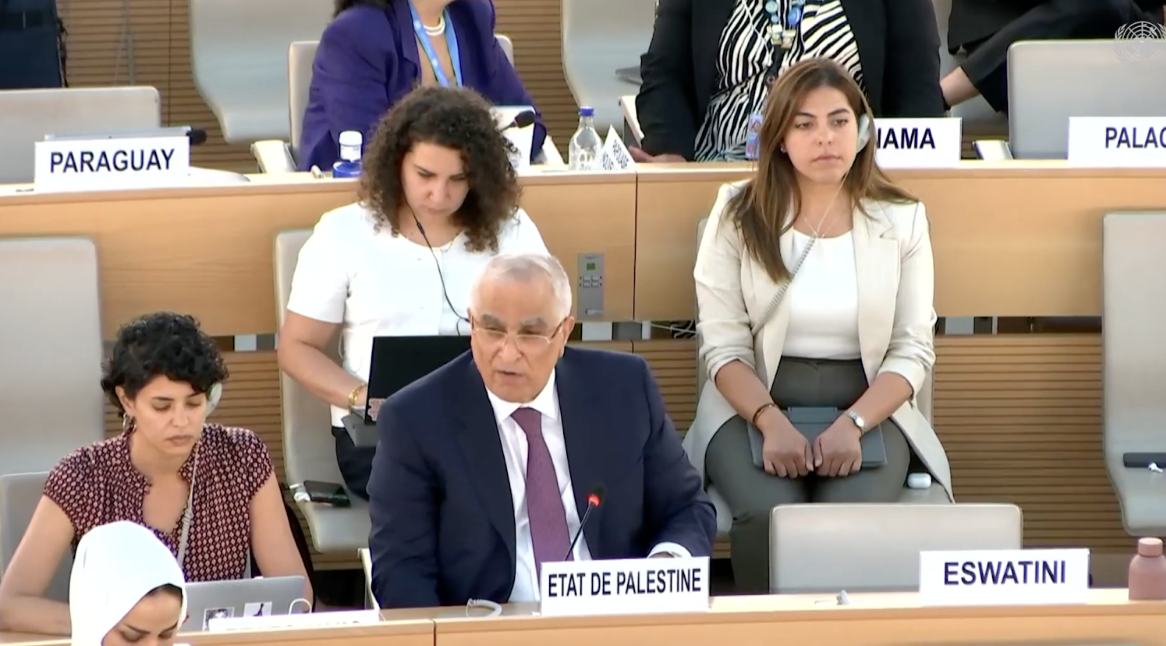
The delegate of Palestine responded by upholding the Commission’s findings, emphasising that Israeli violence has also escalated in the West Bank, with recurrent settler attacks on Palestinians and Palestinian worshipers at non-Jewish heritage sites. The delegate also highlighted that there are more than 900 military checkpoints and iron gates, impeding students’ access to their schools. A large number of schools have also faced closures, including 6 UNRWA schools in East Jerusalem. Furthermore, the delegate characterised the ongoing military assaults on aid sites in Gaza as “mass murder traps,” reporting that 80 Palestinians had been killed in Khan Younis alone while trying to receive food on 17 June 2025.
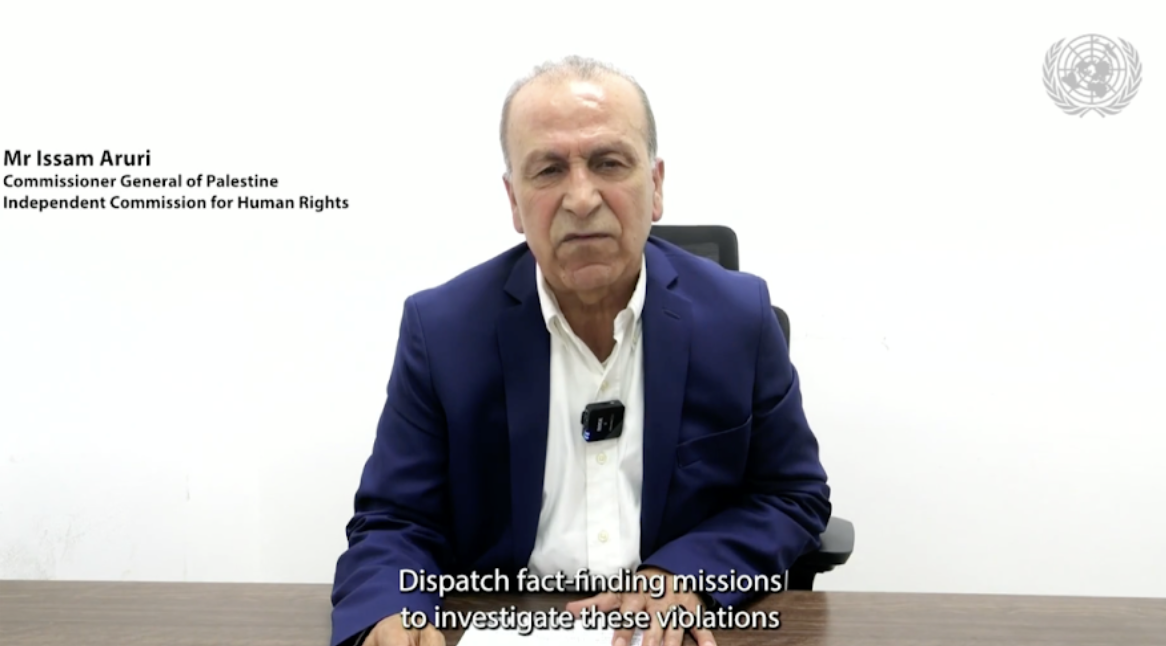
Though not physically present at the meeting, the Independent Commission for Human Rights (ICHR) expressed its support for the Commission’s findings, situating them within the broader context of the systematic nature of violence faced by Palestinians under Israeli occupation. The ICHR called on the UN to dispatch fact-finding missions to investigate, identify, and hold the perpetrators of these violations accountable and urged the international community to take tangible actions to protect Palestinians, their society, and cultural heritage. The ICHR emphasized that IHL and IHR cannot be selectively applied; upholding these principles is not only a moral obligation but a legal one that must be upheld by each member state.
Statement of Other Countries and Groups
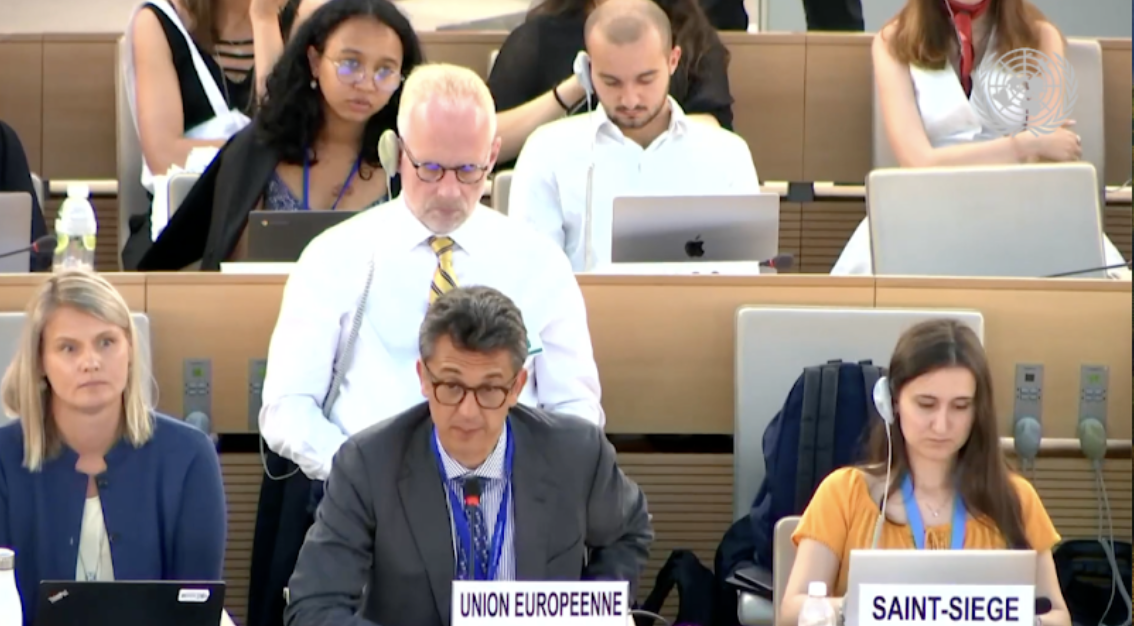
The delegate of the European Union took note of the COI’s report and called on Israel to “fully comply with international human rights mechanisms”. The EU deplored the loss of civilian lives and unequivocally condemned Hamas, while stressing that Israel must “adhere to international law as it exercises its right to self-defense.” The EU strongly condemned the recent escalation of violence in the West Bank and the continued expansion of illegal settlements. It urged the restoration of unhindered access to humanitarian channels and emphasised the importance of preserving the independence of the International Criminal Court and the Rome Statute. The EU also rejected any demographic or territorial changes in Gaza, reaffirming its commitment to a two-state solution as the basis for lasting peace.
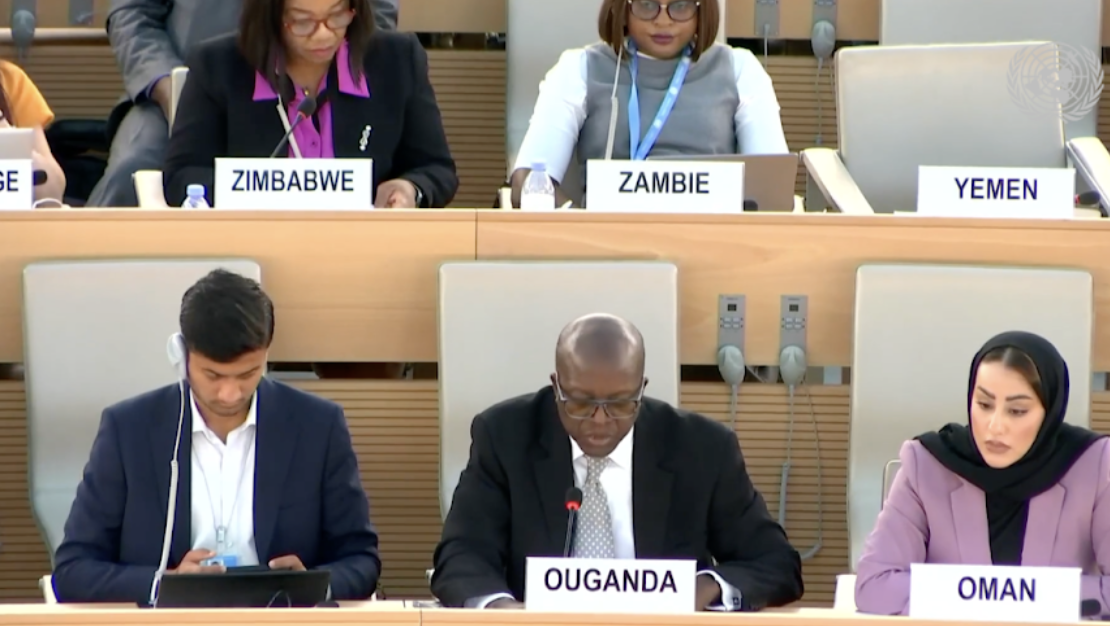
The delegate of Uganda, speaking on behalf of the Non-Aligned Movement, demanded an end to the Israeli policy of forced starvation and displacement in Gaza, calling for an immediate and permanent ceasefire and end to the unlawful occupation of the Palestinian territory. The group also condemned Israel’s military aggression on Iran on 10 June 2025, as a violation of Article 2(4) of the UN Charter, which prohibits the threat or use of force against the territorial integrity or political independence of any state. The delegate urged the international community to open appropriate humanitarian channels to meet the demands of the Palestinian population and to hold Israel fully accountable for its violations of IHL and IHR.
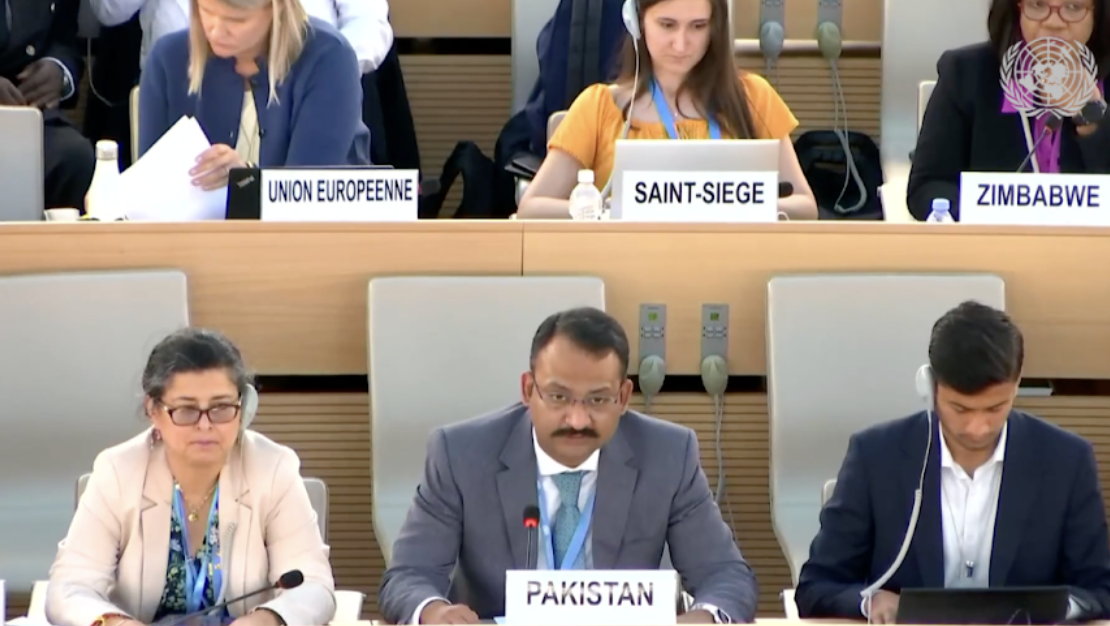
The delegate of Pakistan, speaking on behalf of the Organisation of Islamic Cooperation group, called for an end to the genocide and illegal occupation of Palestinian land, citing Israel’s “intent to exterminate the Palestinian people” by judaising and “wiping out the history of the territory.” The delegate analysed Israel’s attacks on civilian infrastructure, schools, and religious and cultural sites as an “infliction of generational harm” and a “naked attempt” to suppress the Palestinian people’s unalienable right to self-determination. The delegate called the UN and all states to hold Israel legally accountable for its repeated criminal acts.
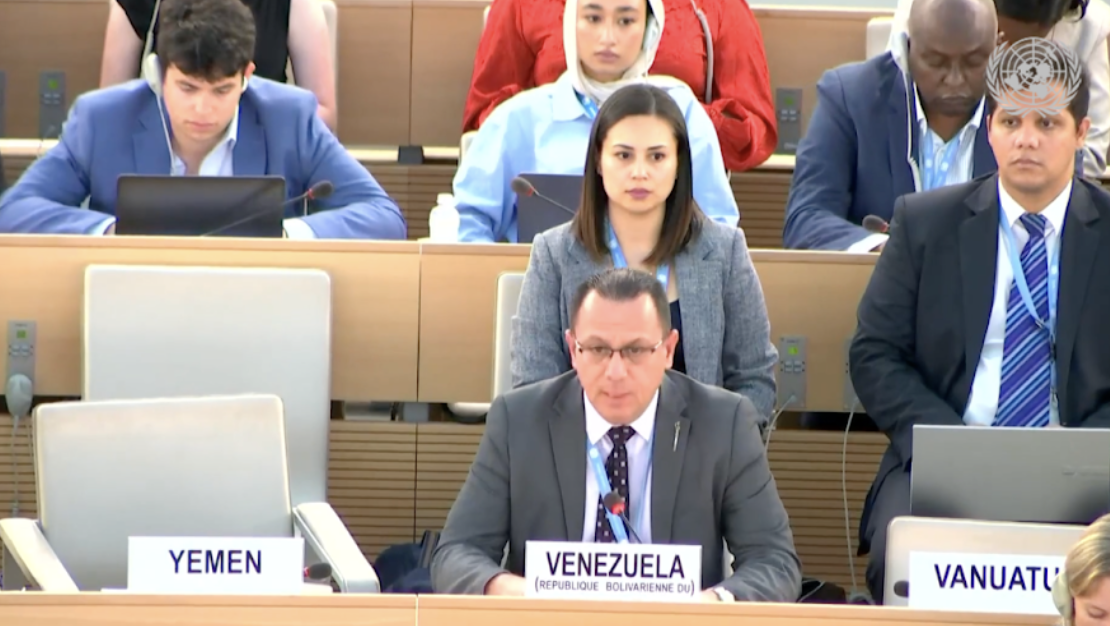
The delegate of Venezuela, speaking on behalf of the Friend of the UN Charter group, analyzed Israel’s actions as pertaining to a clear policy aimed at collective punishment and the “destruction of Palestinian society and identity.” The delegate cited the ICJ order of 26 January 2024, which urged Israel to halt all acts that could constitute genocide against the Palestinians, stating that since then, instead of complying with the order, Israel has intensified its military operations in Gaza. The delegate asserted the group’s support for ongoing actions to identify and trial the perpatrotors of war crimes, and providing compensation for Palestinians.
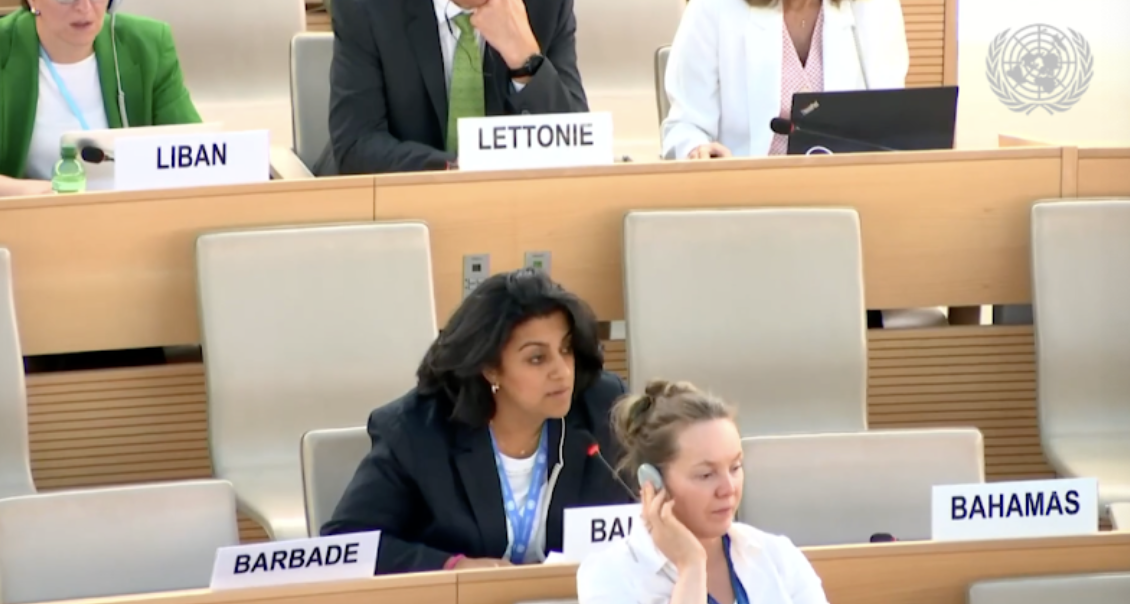
The delegate of Bahrain, speaking on behalf of the Arab States, condemned the occupying power’s continued refusal to cooperate with international human rights mechanisms, particularly the Special Procedures of the Human Rights Council. The delegate described Israel’s systematic policy of targeting civilian infrastructure as war crimes, and further denounced the use of famine as a weapon of war. The group called on the international community to urgently utilize all available mechanisms to ensure accountability, prevent further atrocities, and bring justice to the Palestinian people.
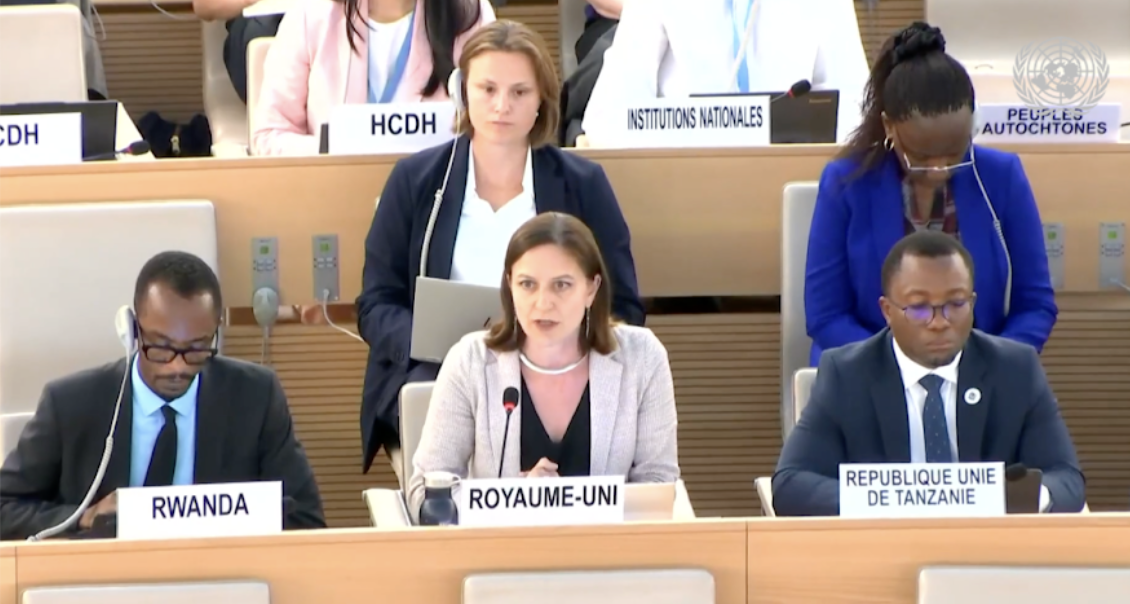
The delegate of the United Kingdom, delivering a joint statement on behalf of Australia, Canada, New Zealand, and Norway, criticised the COI’s establishment on an open-ended basis against “usual practice” echoing its previous concerns about the Commission’s “overly-expansive mandate” and "disproportionate focus on Israel” [2]. The group supported the COI’s efforts in documenting human rights violations, and it opposed Israel’s military escalation in Gaza, citing that more than 55,000 Palestinians had been killed, and demanded independent investigations into the targeting of UN and humanitarian workers. The group announced further sanctions on individual parties and entities that instigate violence in the West Bank, and urged all parties to reach a ceasefire-hostage deal—the only viable solution to ending human suffering and “Hamas control” in Gaza.
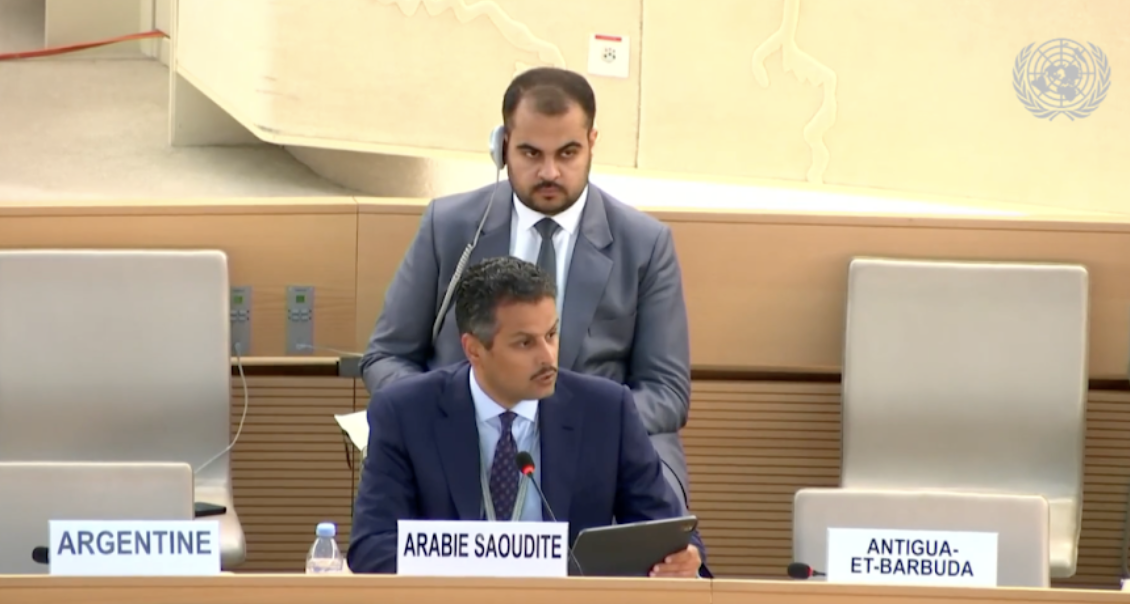
The delegate of Saudi Arabia condemned Israel’s practices of aggression and the forcible expulsion of civilians, declaring that the only “just and comprehensible” solution to the question of Palestine is a full end to the unlawful Israeli occupation and the establishment of a Palestinian state along the 1967 borders “by virtue of the Arab Peace Plan and the relevant UN recommendations.”
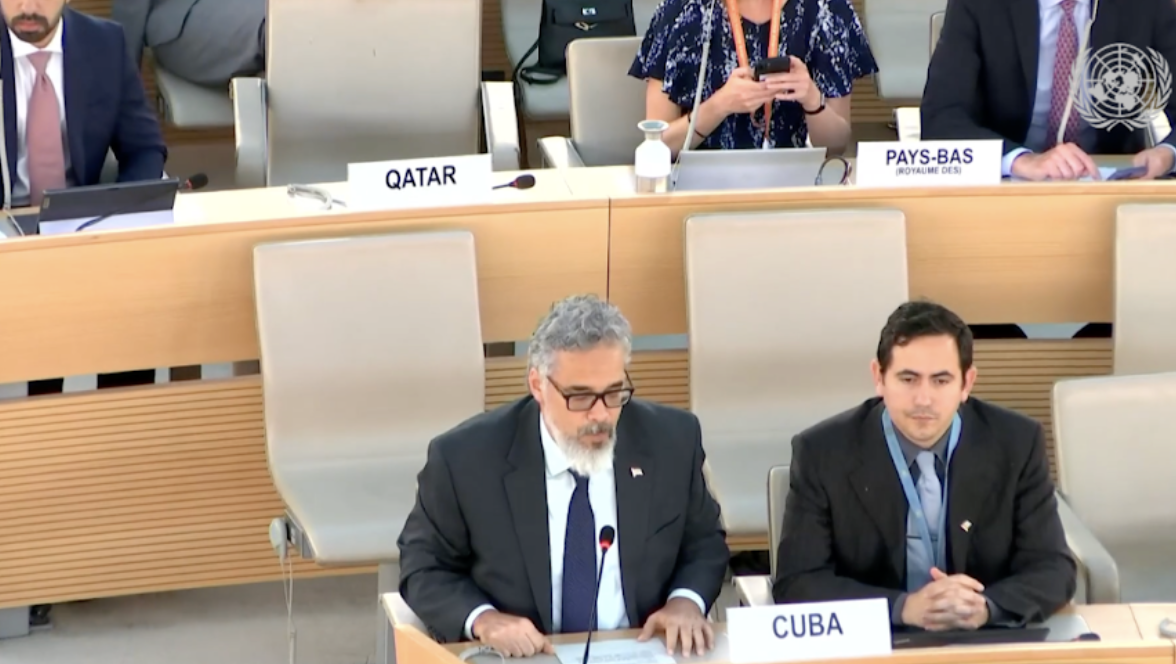
The delegate of Cuba demanded an end to the genocide and commended the Commission’s documentation of Israeli war crimes and crimes against humanity, stating that “this will allow Israel and its accomplices to pay their historic debt to the Palestinian people.” Cuba explicitly denounced U.S. complicity through its provision of military aid and funding, characterising its actions as one of the most serious atrocities recorded by humanity. Cuba also highlighted that in the last 20 months, 463 humanitarian workers have been murdered in Gaza, including 319 UN staff.
Statement by NGOs and Civil Society
Representatives of NGO organisations emphasised the deliberate nature of Israel’s violence against Palestinians and cultural infrastructures, linking these practices to broader patterns of settler-colonial erasure and underscored that they form part of a genocidal campaign aimed at dismantling Palestinian identity, history, and sovereignty. They highlighted that the systematic targeting of schools, religious sites, heritage landmarks, and the use of gender and sexual violence is not incidental but integral to a strategy of domination and displacement, constituting violations of the Geneva Convention, the Convention against Torture and Other Cruel, Inhuman or Degrading Treatment or Punishment, the Convention on the Prevention and Punishment of the Crime of Genocide, and other relevant international law frameworks.
Concluding Remarks
The Commission encouraged all member states to recognise the State of Palestine, debunking the misleading argument that such action equates to “rewarding Hamas terrorism.” On the contrary, Hamas has firmly opposed the two-state solution; by recognising the Palestinian State, member states affirm the Palestinian people’s unalienable right to self-determination under international law. The international community must act decisively: member states have a legal and moral obligation to ensure accountability for ongoing violations and to support a just and lasting resolution grounded in the rule of law, not political expediency or impunity.
GICJ Position
Geneva International Centre for Justice (GICJ) stands firmly behind the Commission of Inquiry’s comprehensive findings, which expose a deliberate and systematic campaign by Israel to undermine Palestinian life, identity, and rights in the Occupied Palestinian Territories. From the destruction of educational and cultural sites to the forced displacement and targeting of civilians, these violations constitute serious breaches of IHL and IHR, including war crimes, crimes against humanity, and acts aligned with genocide under international conventions. GICJ emphasises that the ongoing impunity of Israel and its enablers, including through continued military aid, fuels this cycle of violence and obstructs any path to peace. GICJ calls on every member state to uphold their legal duties to enforce accountability and guarantee unhindered humanitarian access, securing justice and dignity for Palestinians.
Citations
[1] United Nations Human Rights Council. “Ensuring Respect for International Human Rights Law and International Humanitarian Law in the Occupied Palestinian Territory, including East Jerusalem, and in Israel.” Resolution A/HRC/RES/S‑30/1, 27 May 2021. United Nations, undocs.org/A/HRC/RES/S‑30/1.
[2] UN Watch. “Pillay Commission Blasted by US, UK, Germany, Australia, Italy & Others.” UN Watch, 24 Oct. 2023, unwatch.org/pillay-commission-blasted-by-us-uk-germany-australia-italy-others/.




